I have given a lot of thought to The VVitch through the years. I am not sure why, but parts of it have just stuck with me. The one thing I want to get out right away is that if The VVitch had a sub-subtitle, it would absolutely be “Pride Goeth Before a Fall.” Feels so good to get that extremely hot-take off of my chest.
I don’t so much want to go over The VVitch in agonizing detail, as I would rather take a look at what has become to me the messaging behind the movie. I could be entirely off base with all of this, but that is the greatest thing about art; it means something different to everyone. Our interpretations tend to come from our own life experiences, and that makes them unique. I would like to share my thoughts on The VVitch with you now if you will join me.
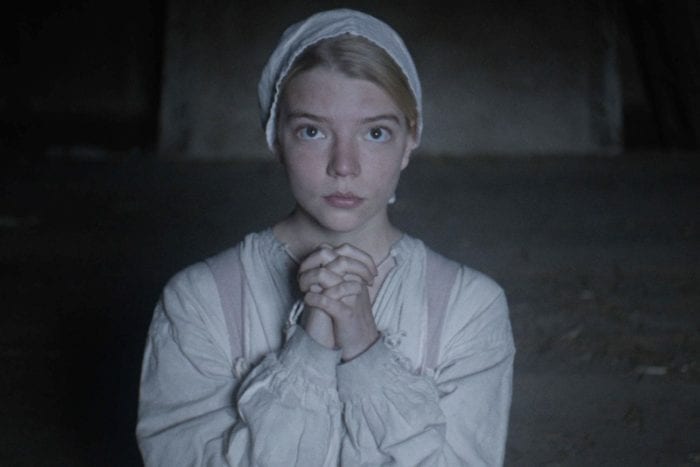
I think there are two ways to look at this film, and they both start and end with Thomasin, played by Anna Taylor-Joy. Every moment of the film is a pebble leading to Thomasin’s fate, and that fate can be seen as either damnation or awakening.
If you take The VVitch literally, then Thomasin signs her name in the book of the Devil and is forever damned. On the other hand, if you shift your perspective a bit, Thomasin has reached maturity and embraced the divine feminine. She has eschewed the binds of her fervent religious upbringing and refuses to follow that path for herself.
The same scenes in the movie get you to either end. The VVitch lets you decide if “living deliciously” is evil or if it is merely the freedom to live at all.
We watch as Thomasin is slowly isolated, starting with her father, William, played by Ralph Ineson, getting them kicked out of their colony. William is prideful to the end, never seeing the error of his ways until it is beyond too late. His pride leads his family to suffer in every way possible. The land he picks is surrounded by woods that turn out to be riddled with witches, which is only one of its many problems.
Because William thinks God drives his choices, he doesn’t seem to notice any fault. This land does not produce the crop, the animals cannot produce, and the looming woods inevitably claim several of his children. William never stops to put the pieces together, not even when his infant son suddenly disappears from Thomasin’s care.
In the end, it is quite evident that the land is cursed, we are left to assume it is by the witches, but William keeps trying to force it to work. His pride will not let him move his family to a better location. If William had made that simple choice, his son Caleb, played by Harvey Scrimshaw, would still be alive, and Anna might never have had to meet Black Phillip. Again, it remains up to interpretation as to whether or not that would have been better for Thomasin.
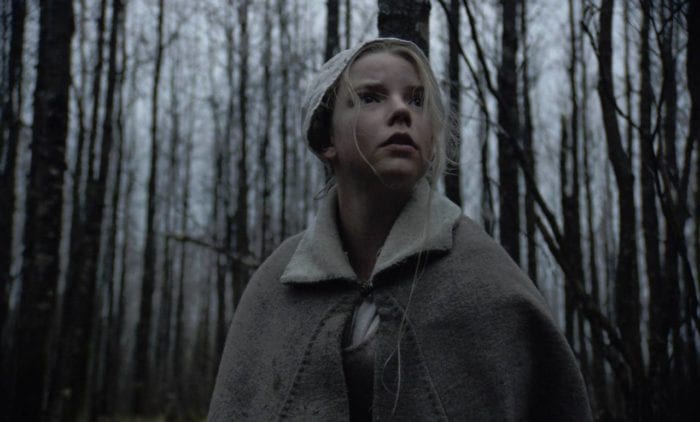
Thomasin eventually tells her father that she believes that the goat is Lucifer and that he has cursed the land, though I tend to think that he only showed up because this family had encroached on his territory. However, William and his wife, Katherine, played by Kate Dickie, would rather believe that Thomasin is a witch and cast her from their sight.
First, Thomasin is removed from her colony, and then she is removed from her own family. Thomasin is left with no one to turn to, which is the only reason she calls for Black Phillip. Had her father listened to her at any point in this journey, Thomasin may have never needed even to know that Black Phillip existed.
I think this film is about the evolution of Thomasin and, more specifically, a commentary on womanhood. I say this because at the time, of course, women were given a single life path, being a wife and mother. Women were burned at the stake for witchcraft, and religious fervor led all decision making, including that women were to be submissive.
Women were so feared that if they stepped out of line at all, or didn’t conform strictly, the accusation of “witch” could and would end their lives. The religiosity in The VVitch is so heavy and bleak; it matches the film’s color pallet. It reeks of despair and dread. They believe that they are all sinners, evil, unworthy of God’s love. Yet they worship him with desperation, clinging to the hope that they are good enough to make it into heaven.
Just typing that all out, I am ready to sign a book from a goat. Thomasin escapes all of this, in my opinion, and gets to live the life she wants, free from the constant fear of not being good enough for a God that doesn’t seem to like her anyway. I don’t see how she loses here. She indeed lost her family, but that wasn’t her fault, nor was it because of anything that she did. That honor lies with her father, in whatever afterlife he finds himself.
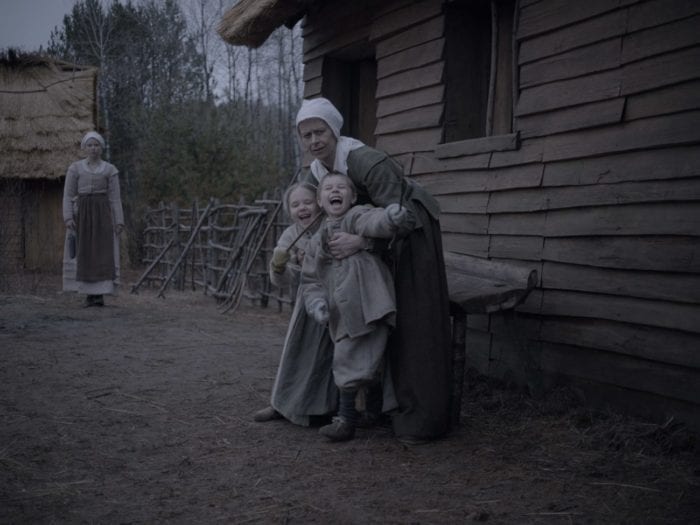
One thing that I cannot let go of, or find satisfactory answers for, is what on earth was going on with the twins? Mercy, played by Ellie Grainger, and Jonas, played by Lucas Dawson, are the most perplexing part of the puzzle. The twins seem to have an extraordinary amount of information for such small children. They know all about what happened to Samuel and Caleb. They are the first to mention Black Phillip, and they speak to him often. Mercy even claims to be “The Witch of The Wood” at one point.
It is never made clear if the twins survived after Thomasin left. I have so many questions. Why were they able to hear Black Phillip in the first place? Why did he choose to speak to them? Did they call upon him, but were too young to sign the book? Does their youth and innocence spare them from the wrath of God and the lure of the Devil? I need answers, but I will probably never get them.
The twins will remain the most unsettling part of The VVitch for me. Their age is never revealed, but they are small and assumed young. However, they look like tiny adults to me. They don’t have the faces of young children, in my opinion, and that might just be because of the time and how quickly children had to grow up. I also find it curious that they cannot be wrangled by any member of the family.
There is a scene where they have been tied to the fence while Katherine tends to an emergency. They do not listen to a single given instruction—the twins just kind of run around creating chaos and doing as they please. Katherine will get on to them, echoed by Thomasin, and then Katherine will, in turn, scold Thomasin. This scene plays out many times. It happens so much that I believe it was intended to catch your attention and create tension and more questions.
No matter what my questions are, it is clear that the twins are urging this whole thing along and creating doubt where Thomasin is concerned. Mercy and Jonas openly accuse Thomasin of being a witch and claim that she is the reason they cannot remember their prayers before falling to the ground in a bewitched frenzy. It was convenient timing, as Caleb, who actually had been bewitched, lay dying, going in and out of torture and joy before finally passing.
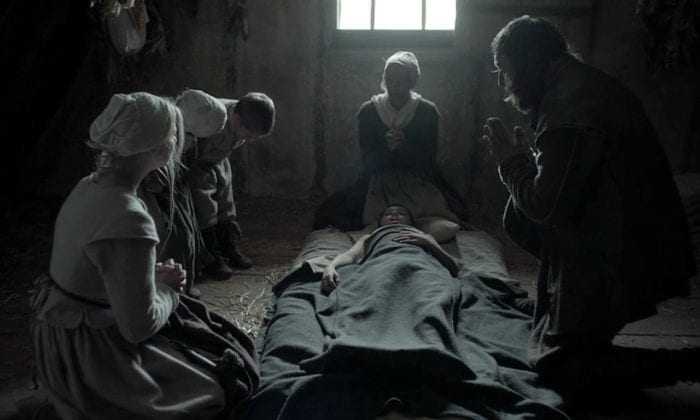
So, what is happening on this farm? How did this family come undone so quickly? I believe the witches either didn’t want them on their land, near their woods, or they were creating mischief and messing with the family. Maybe the witches wanted Thomasin all along, or perhaps they wanted the whole family to take the hint and get the hell out of Dodge. Unfortunately, or possibly thankfully, for Thomasin, William wasn’t capable of taking the hint.
Remember, this is the same man who roamed around in those forbidden woods to set his traps. In secret. An act that probably led to the witches taking Samuel, a thing that Thomasin was made to carry the pain and guilt over. The same man that traded his wife’s silver cup for said traps, and yet again let Thomasin take the heat for his wrongdoings. Does anyone have a Father of the Year trophy available?
In the end, I think The VVitch is a really great movie. It is layered, well-paced, and chaotic. Some people may think I am crazy for calling it chaotic as the movie is a very dry and slow burn, but chaos is in the mix in the moments where it comes alive. The film leaves questions unanswered; it doesn’t spoon-feed you answers and outcomes, and it has some disturbing visuals. The color pallet matches the feeling of dread and the slow decay that is happening all around the family.
It might be impossible to ever divorce Black Phillip or “living deliciously” from the film, nor would I honestly want that to be the case. However, I would like for those things to come secondary to Thomasin and what I choose to believe is her awakening. I love both Black Phillip and his various offers as he finally speaks to Thomasin, but without her journey, we wouldn’t have gotten either.
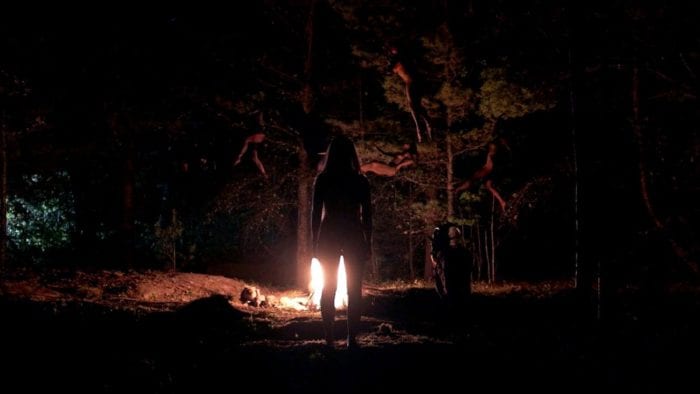
I love the idea of a young woman coming into her own, and changing her world, whether or not her hand was forced. Sometimes that’s how change comes, but she adapted quickly, and I hope she is out there living deliciously, breaking every rule that her father ever put before her.
As for those twins of hysteria and confusion, well, I kind of hope they are doing the same. Maybe off disrupting another family, freeing another young woman, talking to goats all day. That is the ending I am choosing for them, anyway.



I think it’s likely the twins are used in a similar ceremony to the earlier one with the baby. In the end we see the witches rise into the air, which earlier we saw after the witch made an ointment from Samuel and smeared it on herself. There’s a bonfire, perhaps their remains are burned within it.
I think it’s also likely that Black Philip was talking to the twins and manipulating them (speaking lies etc). I don’t think at any point was he interested in convincing them to sign his book, I think his goal was always to corrupt Thomasin and everything he did was a means to that end. She was a virginal, intelligent young woman, already struggling with her faith as her father isolated her from her community.
I think her mother’s (and father’s) treatment of her emphasized how isolated and undefended she was. Her mother, in grief for the baby, lashes out at Thomasin while also relying on her to carry the bulk of the responsibilities she would usually be in charge of. All of these things were slyly manipulated by Black Philip and his witches, but also failings of the family at heart. The rot was already there, like a touch of ergot in their crops. The subtle manipulations of the witches were just to edge it to the conclusion of Thomasin being along and despairing. LOVED this article. I’ve been thinking on this movie lately too.
Thank you for the comment, I love all of your points! I had never considered that the twins may have gone the way of Samuel, that’s going to give me a lot to think about! I really appreciate comments like this, I love knowing that other people have thought about something as much as I have and love something as much as I do.